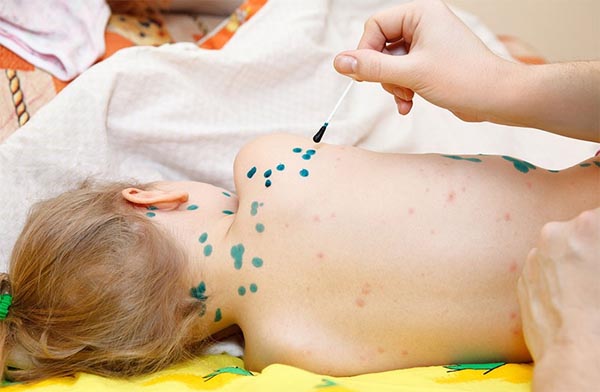DO NOT UNDERESTIMATE THE SIGNS AND COMPLICATIONS OF CHICKENPOX
Chickenpox in young children is not only a nightmare, leaving scars on the skin, but it can also easily spread to others in a short period. Despite many people thinking it's just a case of water blisters, chickenpox can lead to dangerous complications such as pneumonia, encephalitis, and even death. Hot and humid weather is when this disease is most rampant.

4/12/2024 9:36:26 AM
Is chickenpox dangerous?
Chickenpox is an acute infectious disease caused by the Varicella virus. This virus is responsible for chickenpox in children and shingles in adults. Many people mistakenly believe that chickenpox is just a skin disease, so they are careless and only worry about water blisters, which can cause skin infections and scarring. However, the complications of chickenpox are much more severe. Children with chickenpox are at risk of pneumonia, mental disorders, coma, encephalitis, seizures, and most dangerously, death if not promptly treated.
Hot and humid weather is the time when chickenpox is most prevalent. If children have not had chickenpox and have not been fully vaccinated, they may become infected. The transmission route is mainly through respiratory droplets from infected individuals or direct contact through the skin with blisters.
Before the vaccine, over 90% of people had been infected with chickenpox by the age of 15. Many people remember having chickenpox themselves or seeing it on others. It's hard to forget the itchy rash caused by the Varicella virus. Nowadays, thanks to the introduction of the Varicella vaccine, chickenpox has been gradually decreasing.

What are the clinical manifestations of chickenpox?
-
The clinical manifestations of chickenpox in healthy children usually develop within 15 days after exposure and typically include symptoms of fever, fatigue, sore throat, loss of appetite, followed by a rash of water blisters all over the body, usually occurring within 24 hours.
-
The water blisters range from 3-10mm in size, initially clear within 24 hours, and multiple stages of development (with new water blisters alternating with cloudy ones, blisters turning into scabs). Water blisters can occur on the face, body, limbs, and even in the oral and nasal mucosa.
-
The formation of new water blisters usually stops within 4 days, and most lesions scab completely by day 6 in patients. The scabs tend to peel off within 1 to 2 weeks, leaving temporarily discolored skin.
Doctors can usually diagnose chickenpox by examining the rash. In some cases, additional tests may be used.
What is the incubation period and rapid transmission of chickenpox?
-
The average incubation period of chickenpox is 14 to 16 days, although this period can range from 10 to 21 days.
-
Chickenpox is highly contagious, and infected individuals can transmit the disease even before the onset of symptoms or when any signs of illness are present.
-
The period of contagiousness is usually considered to extend from 48 hours before the onset of rash until the skin lesions have completely scabbed over.

Complications of chickenpox
Although the vaccine significantly reduces the symptoms of the disease, complications can still occur, including:
-
Skin/soft tissue infections: Primary chickenpox infection in children is associated with an increased rate of invasive group A streptococcal soft tissue infections. Complications of infection include cellulitis, myositis, necrotizing fasciitis, and toxic shock syndrome.
-
Neurological complications: Encephalitis and formerly Reye's syndrome are the most serious complications of chickenpox virus infection, although they are rare. Less common neurological complications include aseptic meningitis, transverse myelitis, vasculitis, and hemiparesis.
-
These disorders typically develop during the first week of rash, although central nervous system involvement can occur before rash onset.
-
Reye's syndrome: Associated with the use of aspirin to reduce fever during the blistering phase, accompanied by disturbances in consciousness, seizures, nausea, and vomiting.
-
Pneumonia: In children with normal immune function, pneumonia is a rare complication of chickenpox. In contrast, pneumonia accounts for the majority of morbidity and mortality in adults, although since the introduction of the vaccine, the disease has become less common.
-
Other rare complications include chickenpox-related hepatitis, laryngitis, and otitis media...
The chickenpox vaccine has been proven to be an effective measure to prevent the spread of the virus and significantly reduce the risk of contracting chickenpox. For parents who are still hesitant or have questions about the chickenpox vaccine, please consult with your doctor.